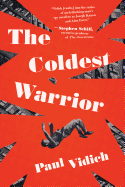
Paul Vidich's The Coldest Warrior begins with a murder. It's 1953, and Dr. Charles Wilson, who had been hired by the government to complete top-secret work, has been killed, pushed out a ninth-floor window. Though the incident has been ruled a suicide, CIA agent Jack Gabriel is ordered by his director to investigate. Gabriel was on the brink of retirement, but he's determined to solve the case--Wilson was an old friend of his. But as Gabriel falls deeper into the suspicious circumstances of the case, it becomes obvious that he can't trust the CIA, the FBI or the White House to be on his side, and it's up to him alone to uncover the truth and keep his family safe.
The Coldest Warrior is a terrifically paced page-turner with convincing red herrings and a surprise ending. These feats are not to be understated. But Vidich also succeeds in crafting incisive portraits of characters, who face their own internal and domestic conflicts. Gabriel struggles to understand his daughter and keep a hold on his marriage, while the CIA and FBI agents who orbit around him grapple with the emotional and physical damage their own webs of deception have wrought. Without ever slowing the pace or detracting from the novel's central mystery or action, Vidich (An Honorable Man) still manages to carve out time in his taut narrative to provide snapshots of men trapped in personal cold wars of their own making. This focus on character gives the novel a cinematic quality, updating the spy genre while still tipping its hat to the beloved tropes that fans know and crave. --Alice Martin, freelance writer and editor

